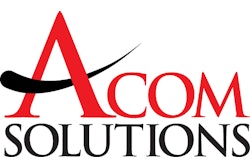Rolls out merged solution following acquisition; provides migration path for QuickSource customers
Sunnyvale, CA — October 5, 2004 — Enterprise spend management specialist Ariba has rolled out a "Visibility and Sourcing Solution feature pack" representing the unification of FreeMarkets and Ariba technological capabilities on a single platform, bringing many FreeMarkets features onto the Ariba platform while also providing a migration path for legacy FreeMarkets customers looking to move to a broader strategic sourcing platform.
Ariba merged with FreeMarkets in July, and this feature pack release integrates leading functionality from both Ariba and FreeMarkets, as well as functionality from automotive industry e-marketplace Covisint, which FreeMarkets acquired last year, and spend data management specialist Softface, which Ariba acquired earlier this year.
New functionality has been incorporated into each of Ariba's Strategic Sourcing modules including Ariba Sourcing, Analysis, Category Management and Contracts Workbench. Steve Markle, product manager for strategic sourcing at Ariba, pointed to several specific areas of upgraded functionality in the Ariba platform, including spend analysis, reverse auction, sourcing project and direct materials sourcing capabilities.
In terms of spend analysis, Ariba now has integrated Softface's data cleansing and data enrichment technology into its Analysis solution, as well as provided more direct-materials reports and data models, to allow its customers to do direct materials piece price and part variance spend analysis as a way of prioritizing their subsequent strategic sourcing activities.
On the Ariba Sourcing side, the provider has included reverse auction and sourcing project capabilities that they brought over from the legacy FreeMarkets products. Markle said the goal here was primarily to accelerate event and auction throughput through the Ariba product, something in which FreeMarkets was ahead of Ariba. "FreeMarkets was the market leader in terms of sourcing services and strategic sourcing, so it's really bringing it together and unifying our capabilities from both a sourcing services standpoint and a strategic sourcing technology standpoint on a single unified platform," Markle said.
Ariba has also incorporated functionality for direct materials sourcing with an eye toward the needs of sourcing specialists in the automotive industry, adding, for example, the ability to do highly sophisticated reverse auctions using non-price factors, or total system cost factors, for piece parts that potentially are going to go into automobiles. When category managers source these types of parts, they generally ask their suppliers to give them visibility into all of the price factors, such as piece part price, tooling and so on. But they evaluate the price factors through net present value, asking the supplier for a percentage reduction on all those cost factors over time, and then discounting the reduction back into the present to do the competition evaluation for that part. The new functionality in the Ariba platform facilities that process, and Markle added that these capabilities are applicable not only to automotive but also to large capital purchases.
The feature pack also adds reverse Dutch auctions to Ariba's lineup of sourcing options. These auctions are useful when a buyer wants to obtain the absolute lowest price that a supplier might offer for a particular commodity. The buyer gradually raises the price that she is willing to pay until enough suppliers have responded that the buyer has met her volume requirements. "Buyers can save money but also time, because if they choose the correct floor price, they can fill all their volume immediately, and then move to the next item," Markle said.
Finally, the new capabilities include updated features targeting global sourcing projects, for example, allowing suppliers to do negotiations in their native currencies, and adding key knowledge bases for buyers to store exchange rates, do conversions as they're going through the decision-making process, and do translations of RFxes into the different native languages of their suppliers to accelerate the suppliers' understanding of the project and, ultimately, to provide better sourcing project results on the backend.
Roger Blumberg, director of visibility and sourcing solutions at Ariba and formerly director of product management for three years with FreeMarkets, said that the impetus behind the new feature pack was, in part, to provide a means of migration for customers of the legacy FreeMarkets solution, QuickSource, to move to the broader set of capabilities available through the Ariba sourcing solution. But Blumberg hastened to add that Ariba is continuing to develop and support QuickSource, including with a new release due out in November.
"All this is optional," Blumberg said of the feature pack. "No one using current FreeMarkets solutions will be forced to migrate. But many customers are looking to move up the 'technology food chain' to strategic sourcing. They want to expand their footprint, but QuickSource really didn't have a footprint outside of doing an [requests for information (RFIs)] or [requests for proposal (RFPs)] and auctions. Ariba Sourcing really allows you to cover the entire spectrum of your spend and the entire spectrum of your sourcing process. We've identified a certain segment of our QuickSource customers that are ready to move on, and those are the ones that we're targeting."
Blumberg said that the transition from QuickSource to the Ariba platform should be fairly straightforward, and Ariba has put together Web-based training to help ease the transition for those customers that go that route. In addition, Ariba is working on data migration tools to facilitate moving a FreeMarkets customer's data, from the legacy application, over to the new platform.
Markle said that Ariba already has a set of customers in the implementation phase with the feature pack, and Blumberg said that the company already has signed several QuickSource customers up to transition to the Ariba platform.
Moving forward, Markle said that Ariba is looking at incorporating deeper reports from the legacy FreeMarkets apps into the Ariba solution, adding service-related requirements to the unified platform, and implementing optimization capabilities for the sourcing decision-making and decision-support process.
Sunnyvale, CA — October 5, 2004 — Enterprise spend management specialist Ariba has rolled out a "Visibility and Sourcing Solution feature pack" representing the unification of FreeMarkets and Ariba technological capabilities on a single platform, bringing many FreeMarkets features onto the Ariba platform while also providing a migration path for legacy FreeMarkets customers looking to move to a broader strategic sourcing platform.
Ariba merged with FreeMarkets in July, and this feature pack release integrates leading functionality from both Ariba and FreeMarkets, as well as functionality from automotive industry e-marketplace Covisint, which FreeMarkets acquired last year, and spend data management specialist Softface, which Ariba acquired earlier this year.
New functionality has been incorporated into each of Ariba's Strategic Sourcing modules including Ariba Sourcing, Analysis, Category Management and Contracts Workbench. Steve Markle, product manager for strategic sourcing at Ariba, pointed to several specific areas of upgraded functionality in the Ariba platform, including spend analysis, reverse auction, sourcing project and direct materials sourcing capabilities.
In terms of spend analysis, Ariba now has integrated Softface's data cleansing and data enrichment technology into its Analysis solution, as well as provided more direct-materials reports and data models, to allow its customers to do direct materials piece price and part variance spend analysis as a way of prioritizing their subsequent strategic sourcing activities.
On the Ariba Sourcing side, the provider has included reverse auction and sourcing project capabilities that they brought over from the legacy FreeMarkets products. Markle said the goal here was primarily to accelerate event and auction throughput through the Ariba product, something in which FreeMarkets was ahead of Ariba. "FreeMarkets was the market leader in terms of sourcing services and strategic sourcing, so it's really bringing it together and unifying our capabilities from both a sourcing services standpoint and a strategic sourcing technology standpoint on a single unified platform," Markle said.
Ariba has also incorporated functionality for direct materials sourcing with an eye toward the needs of sourcing specialists in the automotive industry, adding, for example, the ability to do highly sophisticated reverse auctions using non-price factors, or total system cost factors, for piece parts that potentially are going to go into automobiles. When category managers source these types of parts, they generally ask their suppliers to give them visibility into all of the price factors, such as piece part price, tooling and so on. But they evaluate the price factors through net present value, asking the supplier for a percentage reduction on all those cost factors over time, and then discounting the reduction back into the present to do the competition evaluation for that part. The new functionality in the Ariba platform facilities that process, and Markle added that these capabilities are applicable not only to automotive but also to large capital purchases.
The feature pack also adds reverse Dutch auctions to Ariba's lineup of sourcing options. These auctions are useful when a buyer wants to obtain the absolute lowest price that a supplier might offer for a particular commodity. The buyer gradually raises the price that she is willing to pay until enough suppliers have responded that the buyer has met her volume requirements. "Buyers can save money but also time, because if they choose the correct floor price, they can fill all their volume immediately, and then move to the next item," Markle said.
Finally, the new capabilities include updated features targeting global sourcing projects, for example, allowing suppliers to do negotiations in their native currencies, and adding key knowledge bases for buyers to store exchange rates, do conversions as they're going through the decision-making process, and do translations of RFxes into the different native languages of their suppliers to accelerate the suppliers' understanding of the project and, ultimately, to provide better sourcing project results on the backend.
Roger Blumberg, director of visibility and sourcing solutions at Ariba and formerly director of product management for three years with FreeMarkets, said that the impetus behind the new feature pack was, in part, to provide a means of migration for customers of the legacy FreeMarkets solution, QuickSource, to move to the broader set of capabilities available through the Ariba sourcing solution. But Blumberg hastened to add that Ariba is continuing to develop and support QuickSource, including with a new release due out in November.
"All this is optional," Blumberg said of the feature pack. "No one using current FreeMarkets solutions will be forced to migrate. But many customers are looking to move up the 'technology food chain' to strategic sourcing. They want to expand their footprint, but QuickSource really didn't have a footprint outside of doing an [requests for information (RFIs)] or [requests for proposal (RFPs)] and auctions. Ariba Sourcing really allows you to cover the entire spectrum of your spend and the entire spectrum of your sourcing process. We've identified a certain segment of our QuickSource customers that are ready to move on, and those are the ones that we're targeting."
Blumberg said that the transition from QuickSource to the Ariba platform should be fairly straightforward, and Ariba has put together Web-based training to help ease the transition for those customers that go that route. In addition, Ariba is working on data migration tools to facilitate moving a FreeMarkets customer's data, from the legacy application, over to the new platform.
Markle said that Ariba already has a set of customers in the implementation phase with the feature pack, and Blumberg said that the company already has signed several QuickSource customers up to transition to the Ariba platform.
Moving forward, Markle said that Ariba is looking at incorporating deeper reports from the legacy FreeMarkets apps into the Ariba solution, adding service-related requirements to the unified platform, and implementing optimization capabilities for the sourcing decision-making and decision-support process.












